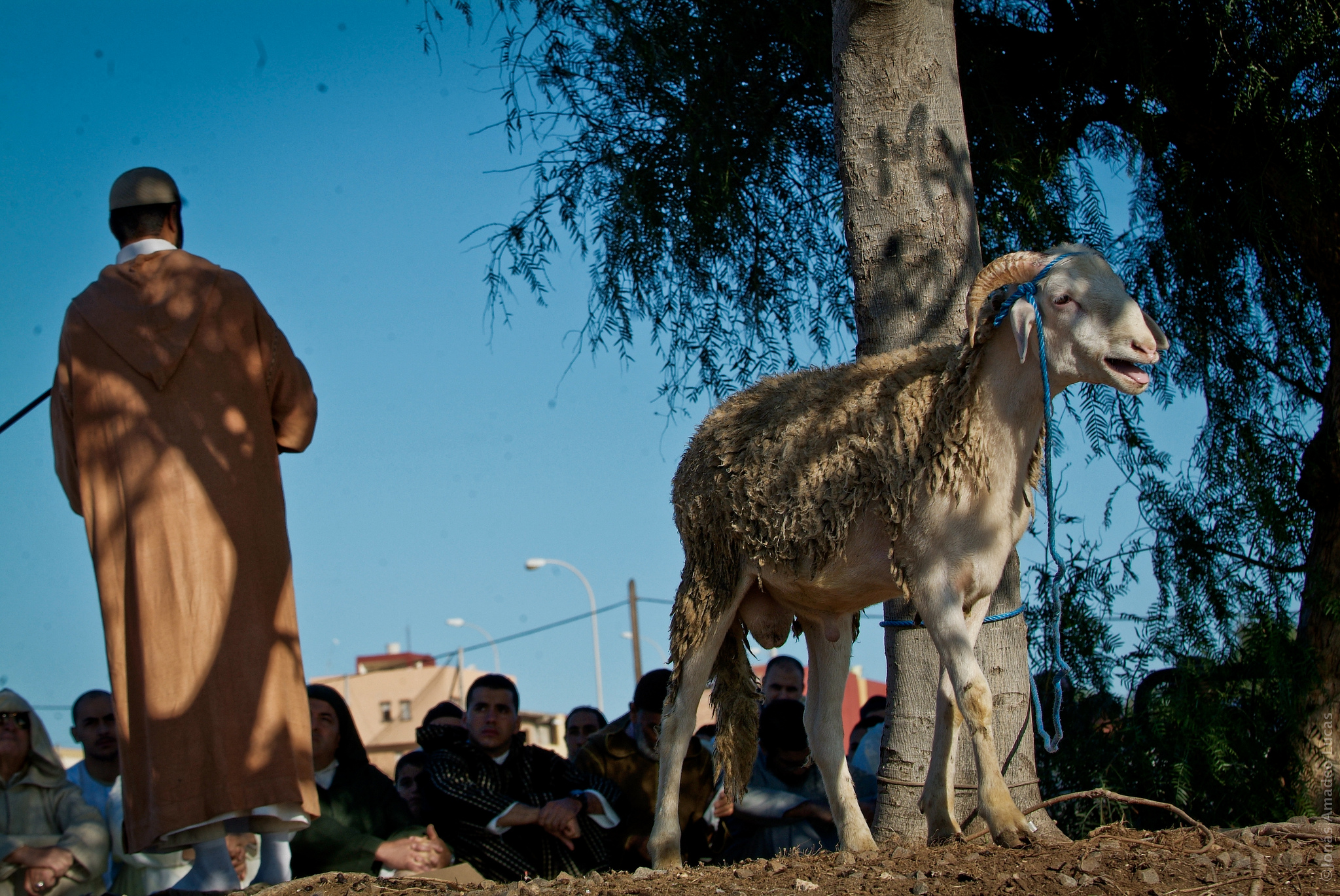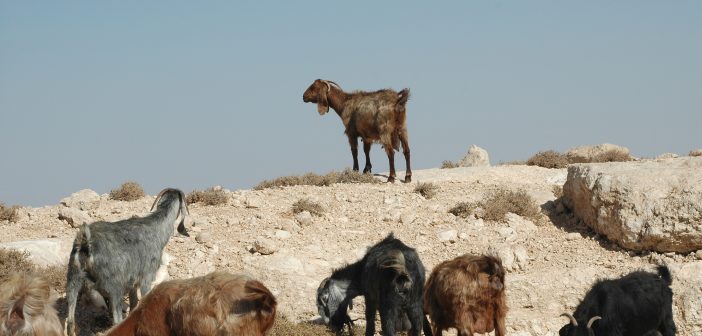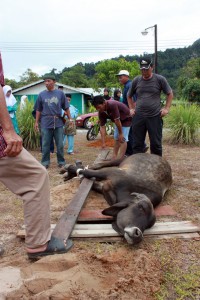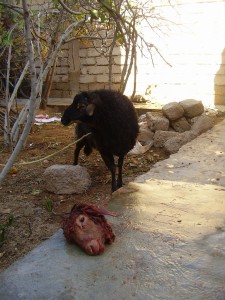(Featured image: goats in the West Bank, Palestine. Credit Kim Bartlett – Animal People, Inc.)
On September 12th, 2016, Muslims around the world will celebrate the Eid al Adha, or “Festival of Sacrifice.” Observed every year on the tenth day of the final month of the Islamic calendar, the Eid al Adha commemorates the story of the prophet Abraham, and his willingness to sacrifice his son Ishmael.
As recorded in the Qur’an, Abraham had a dream in which he was asked to sacrifice Ishmael. He reported the dream to his son, and Ishmael told him to do as commanded, offering his own life in obeisance to God. But God intervened before Abraham could kill Ishmael, telling him, “O Abraham, you have already fulfilled the vision!” The Qur’an continues: “Indeed, We thus reward the doers of good. Indeed, this was the clear trial. And We ransomed him with a great sacrifice, and We left him [favorable mention]among later generations: ‘Peace upon Abraham.'” (37:102-109)

Ram awaiting sacrifice on the Eid al-Adha. Photo credit: TheAnimalDay.org, used under CC BY 2.0
Animal sacrifice is not explicitly mentioned in the Qur’anic account. However, Islamic tradition holds that Abraham ultimately slaughtered a ram in his son’s place (as in the Biblical version of the story followed by Jews and Christians, which differs in several respects, most notably by naming Isaac as the son whose life was at stake). Accordingly, the Eid al Adha is most popularly celebrated through the ritual slaughter of animals, whose meat is divided between family members, friends and neighbors, and poor people.
Though traditional throughout the Islamic world, slaughtering animals for Eid has become a controversial practice. During the October 2014 festival, Egyptian writer Fatima Naoot described the Eid al Adha in a Facebook post as a “massacre” based on a “startling nightmare one of the righteous ones had about his son.” She was charged with contempt for religion, and sentenced to three years in prison and a fine of 20,000 Egyptian pounds ($2500 USD) for her protest of the sacrifice.
Yet while the Egyptian courts may regard Naoot as a blasphemer, many Muslim scholars actually agree with her, and have penned a variety of religious arguments that animal sacrifice is not only unnecessary, but as practiced today may even be haram (“forbidden”) under Islam’s rules on the proper treatment of animals.
Of animal sacrifice, the Qur’an proclaims “It is not their meat Nor their blood, that reaches Allah: it is your piety That reaches Him” (22:37). In the spirit of this passage, Shahid ‘Ali Muttaqi argues in his essay “An Islamic Perspective Against Animal Sacrifice” that animal sacrifice was not itself instituted by God, but adopted by the early Muslim community as a way of turning the slaughter of animals for food – necessary for survival in that time and place – into a spiritual occasion for giving thanks and sharing food with others. It is not the outward ritual, but the inner spiritual state, that is important, and since killing animals for food is no longer necessary to survive for most people in the 21st century, neither is their sacrifice during the Eid. He writes,
“Nowhere in the Qur’an does it suggest that people who do not need to eat meat to survive or who eat meat but do not have access to the same animals present in Arabia are somehow unable to be Muslims.
And nowhere in the Qur’an does it suggest that sacrifice is meant for any purpose other than to thank Allah for that which we have sometimes been obliged to kill, or as a personal sacrifice of something that is considered a possession in order to share it with our more needy neighbors, etc.”
The late Anila Muhammad, former head of Muslims for Progressive Values Toronto and co-founder of Universalist Muslims, concurs with Muttaqi in her article “Should Muslims Reconsider Animal Slaughter on Eid?” Going into more extensive detail as to the cruelty associated with Eid slaughter, she notes that the majority of animals sacrificed in the Middle East are imported from distant countries such as Australia, New Zealand, and Brazil, tightly packed into ships where they suffer for weeks with little or no food or water, surrounded by their own piling excrement. Many die of dehydration or malnutrition, including infants born during the journey.
Footage from a ship carrying 5,000 cows from Brazil to Lebanon, which capsized and sunk on October 6th, 2015
Such treatment is entirely incompatible with the teachings of Islam, which demand that animals be treated with compassion. The Hadith, or sayings of the Prophet, contain numerous stories of him speaking out on behalf of animals: telling a camel’s master not to keep her hungry or tired; stating that anyone who mutilates an animal for fun is cursed by God; forbidding the branding or striking of animals’ faces; allowing snakes to be killed only when they pose a serious threat; criticizing the destruction of anthills, “nations that glorify Allah;” and praising a prostitute forgiven her sins by Allah for giving water to a thirsty dog.
According to a famous hadith related by Abdullah ibn Umar,
“The Messenger of Allah, peace and blessings be upon him, said, ‘If someone kills so much as a sparrow or anything larger without a just cause, then Allah the Exalted will ask him about it on the Day of Resurrection.’ It was said, ‘O Messenger of Allah, what is a just cause?’ The Prophet said, ‘A just cause is that you slaughter it for food, but you should not cut off its head and throw it aside.'”
(Source: Sunan al-Nasa’i 4445)
While Islam does permit the killing of animals for food, it prescribes strict conditions for humane treatment during halal (“lawful”) slaughter: animals cannot be too young, they must be given ample food and water beforehand, cannot be slaughtered in sight or hearing of fellow animals, and should be killed in a comfortable position as quickly and painlessly as possible.

Banner in Jakarta, Indonesia advertising home delivery of animals for slaughter (photo credit Wolf Clifton)
Such conditions are not mere suggestions, but absolute requirements if meat is to be lawfully consumed at all. Umar ibn Al-Khattab (583-644), a companion of the Prophet Muhammad and second caliph of Islam, is said to have beaten a man for leading a sheep roughly to slaughter, and another for holding a sheep down with his foot while sharpening his knife (Stilt, Animal Welfare in Islamic Law, 42-44). With regard to long-distance transport, Anila Muhammad cites the opinion of the late Islamic scholar Al-Hafiz B.A. Masri (1914-1992), that even if an animal is killed perfectly according to the strict rules of halal slaughter, if he has been subjected to cruelty beforehand his meat is haram (forbidden) for consumption.
Sheikh Muhammad Sayed Tantawi (1928-2010) affirms Masri’s view in a fatwa, or legal ruling, issued in 2008 as Chief Imam and Shaikh of Al-Azhar University, the world’s foremost center of Islamic learning. According to the fatwa, it is haram to treat an animal with cruelty during transport as well as at the time of slaughter:
“Islamic law requires that the animal at the time of its slaughter must be treated with kindness and with procedures that guarantee to it mercy. … Any action incompatible with kindness to animals or treating them any way other than with mercy at the time of slaughter… is a forbidden and sinful act, and is inconsistent with the kindness to animals that Islam requires.
…
We advise that Islam’s call for kindness to animals and for treating them with mercy applies to all of the situations in which this mercy is necessary. This includes transporting animals. The transport must be done in a way that is comfortable and that ensures the animal’s safety. The means of transport must protect against the causing of pain to the animal, threat to the life of the animal, or affliction of the animal with diseases contagious to humans or others.”Chief Imam and Shaikh of Al-Azhar
Dr. Muhammad Sayed Tantawi
signed April 24, 2008
In reality, not only are most sacrificial animals transported long distances under torturous conditions, but once they arrive at their destinations many are killed in brutal ways entirely incompatible with Islamic regulations. This may be due to their killers’ ignorance of their religion, inexperience with slaughter (for households that perform the sacrifice themselves), or demand to kill many animals as quickly as possible (for professional butchers tasked with doing so).
- Although Islamic law requires animals to be kept in a comfortable position, this cow has been tied up on her side before slaughter (photo credit: Georgette Tan, used under CC BY-NC-ND 2.0)
- Severed head left in sight of a live sheep, a serious violation of Islam’s humane slaughter rules (photo credit: David Young, used under CC BY-ND 2.0)
According to Islamic legal ruling, the majority of meat produced during the Eid al Adha as currently practiced is therefore actually forbidden to consume.
Considering that Islam does not require animal sacrifice, and that the festival as practiced today inflicts enormous suffering contrary to its values, a strong case can be made that Muslims would better serve their religion by giving up the slaughter of animals. Indeed, according to one hadith it is a holier act to spare a sacrificial animal than to kill it:
“A man said, ‘O Messenger of Allah, I would have slaughtered a sheep but I had mercy on it.’ The Messenger of Allah, peace and blessings be upon him, said, ‘If you had mercy on the sheep, then Allah will have mercy on you twice.'”
(Source: al-Adab al-Mufrad 373)
To learn more about Islamic teachings on animal welfare, and (if you are Muslim yourself) to better decide for yourself whether or not to participate in slaughter this Eid al Adha, please consult any of the resources listed below:
- Animal Welfare in Islamic Law, a comprehensive guide written by Dr. Kristen Stilt and endorsed by Al Azhar University
https://animalpeopleforum.org/2016/09/08/animal-welfare-in-islamic-law-free-book-download/
- Fatwa of Sheikh Muhammad Sayed Tantawi on Slaughter and Transport of Animals
https://animalpeopleforum.org/2016/09/04/fatwa-on-slaughter-and-transport-of-animals-by-muhammad-sayed-tantawi/ - Shahid ‘Ali Muttaqi’s “The Sacrifice of ‘Eid al-Adha:’ An Islamic Perspective Against Animal Sacrifice”
http://www.islamicconcern.com/sacrifice01.asp - Anila Muhammad’s “Should Muslims Reconsider Animal Slaughter on Eid?”
http://www.huffingtonpost.ca/anila-muhammad/animal-muslim-eid_b_1971072.html - Rianne Ten Veen’s “Islam and Animals,” Green Creation
https://greencreationweb.wordpress.com/2014/10/04/islam-and-animals/ - Al-Hafiz B.A. Masri’s “Animals in Islam,” a very thorough overview of the subject addressing slaughter and sacrifice as well as many other issues such as fur, vivisection, and protection of the environment
http://www.call-to-monotheism.com/animals_in_islam__by_al_hafiz_b_a__masri - Two essays by scholar Norm Phelps, a practicing Buddhist who is nonetheless an academic expert on Islam: “Eid al-Adha: Sacrifice in Islam” and “Islam and Animal Rights”
http://newageislam.com/NewAgeIslamArticleDetail.aspx?ArticleID=3631
http://newageislam.com/NewAgeIslamArticleDetail.aspx?ArticleID=2230 - Syed Rizvi’s “Animal Sacrifice or Blood Orgy?” on New Age Islam, further discussing the significance of sacrifice and linking to outside resources, including several of the above
http://newageislam.com/NewAgeIslamDebate_1.aspx?ArticleID=3706 - Arwa Aburawa gives an interesting, somewhat contrary perspective in “Eid al-Adha: The Muslim Festival of Meat?,” in which she acknowledges the merit of vegetarianism but argues that, for the majority of Muslims who will not give up meat, it is better to at least butcher animals themselves than to buy commercially available meat from factory farms
http://www.greenprophet.com/2010/10/eid-al-adha-mea/








4 Comments
God does not like torture, refrain killing animals and please God.
I love you! Thank you! <3
mercy for syria and stop killing turkey in thanks given
Some points are right but it’s not about religion. It’s followers who don’t follow rules do to which the wrong image of any religion is portrayed.